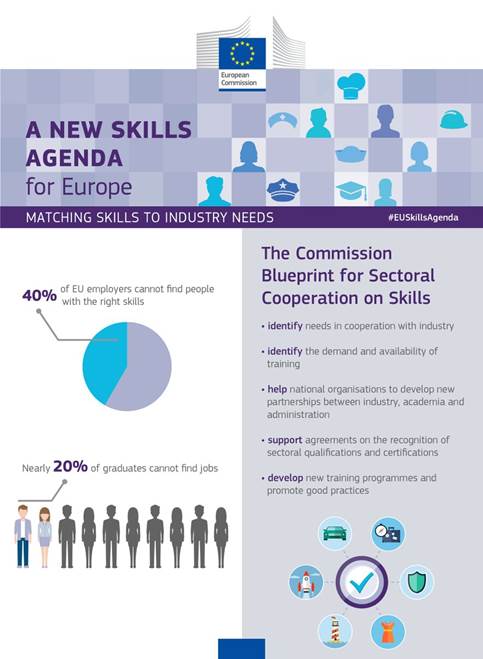New Skills Agenda: a blueprint for sectoral cooperation on skills

date: 10/06/2016
The Blueprint for Sectoral Cooperation on Skills is one of the ten actions in the New Skills Agenda. It will initially be piloted in six sectors that are experiencing severe skills shortages: automotive, defence, maritime technology, textile-clothing-leather-footwear, space (earth observation) and tourism.
The Directorate-General for Maritime Affairs and Fisheries (DG MARE) will coordinate the actions related to the maritime technology sector.
The European maritime technology industry is a forerunner and world leader in terms of innovation and key enabler, providing the more advanced technologies and structures needed to ensure the development of all other maritime activities, such as offshore renewable energies or aquaculture. This is vital to secure Europe's needs in terms of transport, defense, energy and food supply.
Traditional as well as emerging industry sectors may require skills that are not even taught yet. And as the costs of doing business in the EU are higher than in other parts of the world, we need a higher productivity level to compete. Being able to adapt and innovate in an increasingly competitive environment is a major challenge for industry and, at the same time, cooperation and partnerships with formal education and training providers have undeveloped potential.
The demand for skills in the maritime technology sector is changing, due to highly specific niches in which lies its future competitiveness and to the fact that in the growing markets there are more and more competing actors and technologies. A number of changes are already anticipated in the sector and relate to the technological, infrastructural and business-related advancements. In this context, the most important areas of skills for the maritime technology relate to engineering and IT processes.
The Blueprint for Sectoral Cooperation on Skills provides a clear strategy and new instruments to address these issues with the aim of better reply to labour market needs in terms of skills. It will mobilise industry, training and education actors, stimulate private investment and ensure a better use of EU and national funding programmes, based on a clear strategic vision and methodology.
Specifically, the Blueprint will design sector-specific skills solutions based on an industry-led three-step approach that will:
- Collect evidence of skills gaps and their potential impact on growth, innovation and competitiveness
- Translate sectoral strategy into forecasts and actions on jobs and skills
- Roll out EU sectoral partnerships at national and regional level and expand to more sectors
More information
Factsheet: Skills mismatches at sectoral level
Press release: Ten actions to help equip people in Europe with better skills
